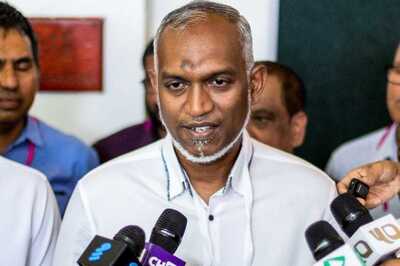
views
London: Prime Minister David Cameron, defending his integrity to parliament in emergency session on Wednesday, said he regretted hiring a journalist at the heart of a scandal that has rocked Britain's press, police and politics.
But in hours of stormy questioning he seemed to rally his Conservative party behind him and stopped short of bowing to demands that he apologise outright for what the Labour leader called a "catastrophic error of judgment" in appointing as his spokesman a former editor of Rupert Murdoch's News of the World.
Only if Andy Coulson, who has since resigned, should turn out to have lied about not knowing of illegal practices at his newspaper would the prime minister offer a "profound apology".
Analysts said Cameron emerged from the debate looking stronger than when he was forced to fly home early from Africa to face lawmakers who had delayed their summer recess by a day. But he left some lingering questions unanswered, notably about his role in Murdoch's takeover bid for TV network BSkyB.
After his toughest two weeks in office, the 44-year-old premier spoke with feeling of the Coulson saga, "You live and you learn and believe you me, I have learnt," he said.
"It was my decision ... Of course I regret and I am extremely sorry about the furore it has caused. With 20:20 hindsight ... I would not have offered him the job."
He said of Coulson, who is under suspicion of conspiring to intercept calls and bribe police: "I have an old-fashioned view about innocent until proven guilty. But if it turns out I have been lied to, that would be a moment for a profound apology.
"And, in that event, I can tell you I will not fall short."
Beleaguered but hardly under serious threat of being ousted by his party allies after less than 15 months in power, Cameron defended his actions and those of his staff in dealings with Murdoch's News Corp global media empire and with two senior police chiefs who resigned this week over the affair.
"He seems to have gained a bit of breathing space over the course of this debate," said Andrew Russell, senior politics lecturer at Manchester University. "He looked more self assured today than he has been for a little while."
Conservative member of parliament George Eustice spoke for a party relieved by the leader's performance: "Cameron did really well. He's got back on the front foot and taken the initiative."
He added, "The idea that his position as prime minister was in doubt was a complete nonsense."
Labour's Ed Miliband, whose muted first year as opposition leader has been fired up by attacking Cameron on the scandal, has not gone so far as to demand Cameron's resignation.
But he asked during the debate: "Why doesn't he do more than give a half-apology and provide the full apology now for hiring Mr Coulson and bringing him into the heart of Downing Street?"
Opposition members of parliament questioned the credibility of Cameron's defence that Coulson had assured him when being hired in 2007 that, as editor of the News of the World, he knew nothing of the hacking of voicemails which led to the paper's royal correspondent and an investigator being jailed.
Coulson left Cameron's office in January just before police reopened an investigation in which Coulson and his predecessor as editor, Rebekah Brooks, have been arrested and bailed.
Labour lawmakers also questioned Cameron about contacts with Murdoch and his staff, including his friendship with Brooks, who resigned as head of British newspaper unit News International.
The prime minister repeatedly deflected questions on what he may have discussed with News Corp about its $12-billion bid to buy out other shareholders in BSkyB, insisting he had "no inappropriate" conversations and played no role in a government decision to let the bid proceed in the face of protests it would give Murdoch too great a share of media ownership in Britain.
Last week, as scandal engulfed News International, Cameron joined Labour in calling for News Corp to drop it. It did.
Cameron's Media Minister Jeremy Hunt, who would have made the final decision, later told parliament: "The discussions the prime minister had on the BSkyB deal were irrelevant".
"They were irrelevant because the person who was making this decision was myself," Hunt said.
His comments were immediately seized on by Labour.
"What we need to know is what were the nature of those conversations, when did they happen and how did they influence the decision-making process," Labour's media spokesman Ivan Lewis told BBC TV.
While he has derided suggestions from some on the left that backing the BSkyB bid might have been a payback for Murdoch's papers switching from supporting Labour to promoting Cameron at the 2010 election, Cameron told parliament it may make sense to "further remove politicians" from decisions about media mergers.
Tim Bale, politics professor at Sussex University, said Cameron had sounded evasive on the subject and could face a drip-feed of criticism from the scandal for a long time: "There was a very strong sense of him searching for a form of words that would not get him into trouble. The Commons picked up on that and there will be more questions to answer in that regard."
Before the debate, a poll by Reuters/Ipsos MORI showed Britons' satisfaction with Cameron had fallen to its lowest level since he entered office in May last year. Only 38 percent were happy with the way he was doing his job.
But Helen Cleary of Ipsos MORI cautioned: "We know from other scandals that public opinion tends to bounce back."
And she added: "Even now, after Ed Miliband's boost from the scandal, Cameron is ahead ... on personal satisfaction ratings."
Cameron tried during the debate to move the political agenda away from the scandal, saying voters wanted him to concentrate on handling an economic crisis and other pressing matters.
Bale said: "It's going to be very difficult to draw a line under it permanently. But stressing the need to ... start talking about some of the very serious issues on the economy that are going on makes intuitive sense to a lot of people."
A day after Murdoch apologised to a parliamentary committee but denied personal responsibility for the affair, Cameron gave details of a judicial inquiry he has ordered into the scandal and wider issues it has raised over relationships among Britain's media, police and political establishment.
The scandal exploded in the public consciousness on July 4, when the family of a schoolgirl abducted and murdered in 2002 said police had told them they believed someone from the paper had hacked in to the teenager's voicemail, misleading detectives looking for her and giving her parents false hope.
Police say 60 officers are probing the hacking of messages of possibly 4,000 people, not just the rich, famous or powerful, but crime victims and families of soldiers killed in action.
Many of the leads come from the notes of Glenn Mulcaire, an investigator jailed with the News of the World reporter in 2007.
The 80-year-old Murdoch, who was attacked by a protester with a foam pie during Tuesday's committee hearing, sent a message to his staff that his company was taking steps to ensure that "serious problems never happen again".
"Those who have betrayed our trust must be held accountable under the law," he said in an e-mail sent late on Tuesday.
An ethics board which Murdoch set up this week said it had now ended continuing payments for legal costs to Mulcaire -- payments questioned by the parliamentary committee on Tuesday.
News Corp said it had authorised law firm Harbottle and Lewis, which advised in 2007 that emails uncovered by News International during an internal review did not show any criminal behaviour, could answer questions from the police and lawmakers about their role.
On Tuesday, Britain's former Director of Public Prosecutions Lord Macdonald, brought in earlier this year by News International to re-examine evidence, told lawmakers he immediately concluded that the emails discovered during an internal review should be passed to the police.
He said the News Corp board were "stunned and shocked" when he told them and added: "If the police had seen that file in 2007, Operation Elveden (the inquiry into claims journalists bribed police officers) would have been opened in 2007."
Shares in News Corp gained 0.7 per cent in New York, adding to Tuesday's 5.5 per cent rise. Some investors speculate the scandal may hasten a handover of power in the company from the Murdoch family in a way that may streamline global operations.




















Comments
0 comment